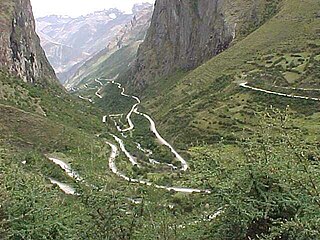
Llaqtapata (Quechua) llaqta place, pata elevated place / above, at the top / edge, bank, shore, pronounced 'yakta-pahta', hispanicized Llactapata) is an archaeological site about 5 km (3.1 mi) west of Machu Picchu. The complex is located in the Cusco Region, La Convención Province, Santa Teresa District, high on a ridge between the Ahobamba and Santa Teresa drainages.

The Inca Bridge or Inka Bridge refers to one of two places related to access to Machu Picchu, in Peru.

Chumbivilcas(3D-map) is a province in the Andes in South Peru. The Inca called it "Chumpiwillka". The seat of the province is Santo Tomás. Officially Chumbivilcas was founded on June 21, 1825.

Calca Province is one of thirteen provinces in the Cusco Region in the southern highlands of Peru. Its seat is Calca.

Canchis Province is one of thirteen provinces in the Cusco Region in the southern highlands of Peru.

Urubamba Province is one of thirteen provinces in the Cusco Region in the southern highlands of Peru.

A previously unknown Inca settlement, Quriwayrachina or Quri Wayrachina, was found in the Willkapampa mountain range in the Cusco Region of Peru in 2001. The site lies in the Santa Teresa District of the La Convención Province, north of the archaeological site of Choquequirao and west of the mountains Kiswar and Quriwayrachina (Corihuayrachina), on a mountain named Victoria. Close to nearby ancient Inca mines, the surrounding hills are covered with the littered stones from more than 200 structures in this Inca outpost.

The Ocongate District is one of the twelve districts in the Quispicanchi Province in Peru. Created on January 2, 1857, its capital is the town of Ocongate.
Ccorca District is one of eight districts of the Cusco Province in Peru.

Huayopata District is one of ten districts of the province La Convención in Peru.

Vilcabamba District is one of eleven districts of the La Convención Province in the Cusco Region in Peru.

Inti Punku or Intipunku is an archaeological site in the Cusco Region of Peru that was once a fortress of the sacred city, Machu Picchu. It is now also the name of the final section of the Incan Trail between the Sun Gate complex and the city of Machu Picchu. It was believed that the steps were a control gate for those who enter and exited the Sanctuary.

Patallacta, Llactapata or Q'ente Marka is an archaeological site in Peru located in the Cusco Region, Urubamba Province, Machupicchu District. It is situated southeast of the site Machu Picchu, at the confluence of the rivers Cusichaca and Vilcanota on a mountain named Patallacta.

Cayco is a 5,108-metre-high (16,759 ft) mountain in the Vilcabamba mountain range in the Andes of Peru. It is situated in the Cusco Region, La Convención Province, on the border of the districts of Santa Teresa and Vilcabamba. Cayco lies southwest of Choquetacarpo and northeast of Pumasillo and a lake named Pumasillococha.

Curcurorjo is a mountain in the Andes of Peru, about 4,400 m (14,400 ft) high. It is located in the Cusco Region, La Convención Province, Huayopata District, and in the Urubamba Province, Machupicchu District. Curcurorjo lies in the northwestern extensions of the Urubamba mountain range, northeast of the archaeological site of Machu Picchu.

Tunquiorjo is a mountain in the Andes of Peru, about 4,200 m (13,800 ft) high. It is located in the Cusco Region, La Convención Province, Huayopata District, and in the Urubamba Province, Machupicchu District. Tunquiorjo lies in the northwestern extensions of the Urubamba mountain range, northeast of the archaeological site of Machu Picchu.

Kaiko is a 5,265-metre-high (17,274 ft) mountain in the Vilcabamba mountain range in the Andes of Peru. It is situated in the Cusco Region, La Convención Province, on the border of the districts of Santa Teresa and Vilcabamba. Kaiko lies northeast of Choquetacarpo and northwest of Pumasillo.

Pucapuca is a 5,450-metre-high (17,881 ft) mountain in the Vilcabamba mountain range in the Andes of Peru. It is situated in the Cusco Region, La Convención Province, Santa Teresa District. Pucapuca lies southwest of Choquetacarpo and west of Pumasillo.
















